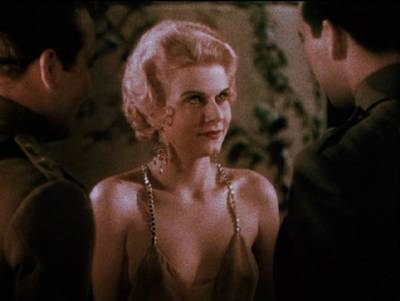
James Hall, Jean Harlow, and Ben Lyon in Hell's Angels
HELL'S ANGELS (Howard Hughes, 1930)
Martin Scorsese's THE AVIATOR spurred my interest to track down Howard Hughes' HELL'S ANGELS. The 1930 film has some major weaknesses--most of the expository scenes, especially a creaky beginning--but there's enough stunning stuff in it to make it worth seeing. The two big action sequences--a German zeppelin's mission to bomb Trafalgar Square and the English bombing of a depot with subsequent dogfight--are great. Hughes tints some scenes to nice effect, like the violet dawn sky during a duel, and the ballroom dance provides an interesting example of early color film. (The two DVD screencaps are taken from this part of HELL'S ANGELS.) Also notable is Jean Harlow's performance, which has a high sexual charge that is sort of shocking today and must have been scandalous at the time of the film's production.

Jean Harlow and James Hall in Hell's Angel's
Harry Behn and Howard Estabrook get screenplay credit, with Joseph Moncure March and Marshall Neilan being tabbed for story, so there's plenty of blame to share for this muddled mess. Oxford-attending brothers Roy and Monte Rutledge (James Hall and Ben Lyon) enroll in England's Royal Air Force during World War I. A German school buddy (John Darrow) is called up by his country's military and forced to fight against the people and land he's grown to love. This conflict plays a minor part in the film's first half before being dropped--literally.
The story doesn't amount to much more than an excuse to stage flying stunts, although the criticisms of capitalism and war add a curious flavor to the film. Monte's eagerness to escape the consequences of war, even if it means betraying his fellow soldiers, doesn't make him a hero, but Roy's earnest patriotism isn't exactly upheld as an ideal either. (Maybe Monte is more easily forgiven since he was suckered into enlisting by the promise of a girl's kiss. Shouldn't the RAF have realized he's a lover, not a fighter?)
The best non-action moments are pure melodrama that put people in unimaginable scenarios. As the end of the film's first half approaches, a zeppelin captain gives his men an unthinkable command. At the conclusion Roy and Monte are faced with an awful choice: reveal England's plan of attack to the Germans or be executed. The dialogue and performances--save Harlow--leave much to be desired, but in spite of its considerable flaws, HELL'S ANGELS is an astonishing film.
Grade: B
No comments:
Post a Comment